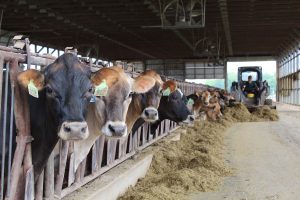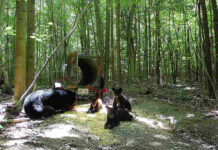MARION, Ohio — The dairy industry is rapidly changing, and 30-year-old dairyman Karl Wedemeyer is doing what he can to position his family farm for success.
As dairy farmers struggle to survive, he sees the industry moving toward more consolidation and larger herds.
“We’re trying to scale our business and be able to compete with farms larger than us,” he said.
Karl farms full-time with his brother, Derek, and his parents, Lee and Colleen, and together they operate White Diamond Farm, in Marion County.
They milk about 170 head of mostly Jersey cattle, and even though that’s a medium to small size herd by today’s standards, it’s a significant increase from when his parents started dairying in 1999.
Age: 30
County: Marion
Education: B.S., Animal Science, OSU
Acres: 85
Head of cattle: 170Looking ahead
“We feel the dairy industry is going to continue to consolidate and we’re trying to prepare the farm for that future. We also see the dairy industry becoming more vertically aligned.”Managing costs
“Bid out your projects and constantly make sure you’re buying the lowest cost available to your dairy.”
Talk to other farmers and find solutions that will work best for your own farm. Share ideas with other young farmers and commit to the ones that make most sense.
His parents started with 25-30 cows, and gradually expanded the operation, building a new freestall barn in 2008, and a new double-12 milking parlor in 2016.
Karl, a graduate of the Agricultural Technical Institute and Ohio State University in Columbus, said his goal is to produce enough milk to be able to fill a tanker truck every other day, or ideally every day.
Karl said there are only a handful of dairy farms left in his county, and it’s increasingly important to align the farm with the changing landscape.
The family only owns about 85 acres, but works closely with area grain farmers to purchase silage and apply manure. Karl said it is nice to have grain farmers as neighbors, because they produce good silage and the manure helps replenish the soil.
Balancing act
The Wedemeyers do their own planting, but hire custom operators to handle harvesting and most of the manure application. They also rely on a producer in Wayne County to raise their heifers, giving the family more time to focus on milk production.
Karl said that being a young farmer means he hasn’t had as much time to build equity and experience as a multi-generation farmer. And even though the dairy is technically in its second generation, it’s still a young farm because Karl’s parents didn’t start dairying until later in life.
One thing he has learned is the need for managing risk.

His advice for other young farmers is to know your cost of production, and study what other farmers are doing.
“Really go seek out other farms that are successful — see what they’re doing and see what you can learn from them,” he said. “A lot of the best things I’ve learned are from other dairy farmers. Also, make sure that you really understand the business aspect and knowing what your costs are.”
Managing risk
Karl relies on the risk management tools provided by his milk marketer, Dairy Farmers of America, and he constantly evaluates his production costs and his efficiency.
He said he looks up to older farmers, who have more experience, but he actually finds that he learns the most from farmers his own age.
He exchanges ideas with other young farmers on a regular basis, and tries to “emulate” the best solutions.
Karl is also involved with a number of young farmer organizations, including Ohio Farm Bureau Federation’s Young Ag Professionals program. He is currently president of Marion County Farm Bureau.
Although Karl makes many of the management decisions on the farm, his family farms together as partners, with input from each person.
“I think the No. 1 thing I enjoy most about it is working with my family,” he said. “Even though we may not always get along every single day, overall, that’s probably the thing I like most about dairy farming.”
See more young and farming features by clicking here.










